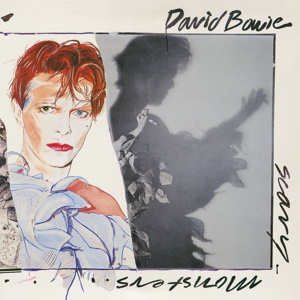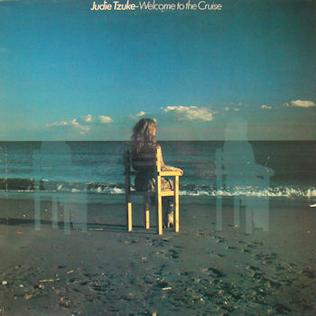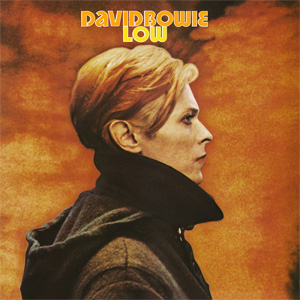 Album title: Scary Monsters (and Super Creeps)
Artiste:
Album title: Scary Monsters (and Super Creeps)
Artiste: David Bowie
Genre: Art rock, New Wave, Post punk
Year: 1980
Label: RCA
Producer: David Bowie and Tony Visconti
Chronological position: Fourteenth album
Notes:
Album chart position: 1 (UK) 12 (US)
Singles: “Ashes to ashes”, “Fashion”, “Scary monsters”, “Up the hill backwards”
Lineup: David Bowie – vocals, keyboards, backing vocals, saxophone
Dennis Davis – percussion
George Murray – bass guitar
Carlos Alomar – guitars
Chuck Hammer – guitar synthesizer on "Ashes to Ashes" and "Teenage Wildlife"
Robert Fripp – guitar on "Fashion", "It's No Game", "Scary Monsters (And Super Creeps)", "Kingdom Come", "Up the Hill Backwards", and "Teenage Wildlife"
Roy Bittan – piano on "Teenage Wildlife", "Ashes to Ashes" and "Up the Hill Backwards"
Andy Clark – synthesizer on "Fashion", "Scream Like a Baby", "Ashes to Ashes" and "Because You're Young"
Pete Townshend – guitar on "Because You're Young"
Tony Visconti – acoustic guitar on "Scary Monsters (And Super Creeps)" and "Up the Hill Backwards", backing vocals
Lynn Maitland – backing vocals
Chris Porter – backing vocals
Michi Hirota – voice on "It's No Game (No. 1)"
The album that would, after some definite chart success, return Bowie to the very top of his game, so much so that many people (including me at the time) had all but forgotten him before he burst into the number one spot with his updated “Space Oddity”, telling the tale of what had happened to Major Tom over a decade ago, in “Ashes to ashes”. This would not be the only hit single from the album, which would itself power to the top in the UK and just edge below the top ten in the US, significant improvements on his last two albums.
Review begins
Strangely enough, “It's not a game (Part 1)” has some Japanese bird singing in her native language as the album kicks off, but Bowie soon comes in with his inimitable vocal and the song is a mid-paced hard rocker whose melody owes rather a lot to Robert Palmer's “Addicted to love”, with Robert Fripp racking out the riffs on the guitar. I have of course no idea what the Japanese lady - whose name is, according to Wiki, Michi Horata, but it means about as much to me as it probably does to you - is singing, but it kind of doesn't matter. I think Bowie is singing the translation anyway. The song ends with Bowie shouting angrily “Shut up!” and we're into a song I do know.
I'm not that well-versed in this album at all, but “Up the hill backwards” is one track I have heard, and again oddly it reminds me of Bucks Fizz (yeah) in the sort of slow marching melody of the verses. Bowie's vocal is either multitracked or there are backing vox supporting him all through the song, giving the singing a weird kind of full, echo effect. Strange. It's quite anthemic in a restrained kind of way, then breaks into guitar histrionics from Fripp, which are kind of worth the price of purchase on their own, even if for some mad reason you didn't like Bowie. Good, tight percussion from Dennis Davis, and the song is over too soon, taking us into the title track, which rocks along with a krautrock flavour, a touch of Eastern European in the main guitar riff in the chorus, and Bowie putting on a cockney accent which really adds to the song. Great fun; sort of puts me in mind stylistically of “Suffragette City”, not sure why...
Again, this song features some great rolling percussion from Davis that really drives it, another mad solo from Fripp and some solid acoustic guitar from producer Tony Visconti, who also adds his voice to the backing vocals. The big hit single sees us return to the days of Bowie's beginnings, with Major Tom returning to take him to number one for the first time in years as “Ashes to ashes” lays down the marker and states in no uncertain terms that the Thin White Duke is back. A great idea with some wonderful touches in the song, including a sort of murmured choir that repeat the lines Bowie sings like a bunch of acolytes praying. A very freaky video, if I remember correctly. Great strong vocal from the man, and some nice guitar synthesiser popping all over the track, creating a very otherworldly feel and really making you believe you're standing on the surface of an alien planet. Well, it makes me feel that way.
Another hit then is up with “Fashion”, another stab at krautrock and perhaps a sly dig at himself , trendsetters and sheep maybe, the way people follow whatever's “in” at the time. A drum loop at the beginning perhaps a comment on how things go out of fashion and then come back in again, and the whole stupid cycle repeats itself, like a stuck record (oh, look it up!), as Fripp batters all in sight with his guitar riffs and soundscapes. Speaking of taking digs, the next track up sneers at the new wave kids, the likes of Gary Numan maybe, Fiction Factory and A Flock of Seagulls, as Bowie watches them ape the moves he pioneered in “Teenage wildlife”. For me, the standout on the album, it's based quite heavily on the main melody to “Heroes”, but never sounds like a copy of that classic. Bowie is at his expressive best here singing, with the criminally-ignored-by-me Carlos Alomar making his presence felt in the absence of Fripp, and firing off an emotional and powerful solo, Roy Bittan doing a fine job on the piano, and the whole thing just flows so well that it really should have been a single. Mind you, it would have had to have been cut down considerably from its almost seven-minute running time. Could have been a huge hit though. Sorry,
another huge hit. Love this track. Something like tubular bells or the like there near the end, with a kind of funky run on the piano and guitar too. Another superb solo from Alomar, and a fine punching drumbeat from Davis.
Hard to follow that maybe, and “Scream like a baby”, though a good track, doesn't quite cut it for me. There's nothing wrong with it necessarily, it's just that a song would have to be immense to be able to trump “Teenage wildlife”, and this one ain't got the bus fare mate. It's a hard, grinding rocker with a snarly guitar line from Alomar and some pretty frenetic synth from Andy Clark, a dark, dystopian tale of a political prisoner, set in the future. Some very new-wave keys from Clark add a surreal feel to what is already a pretty out-there song, and some sort of baritone singing from Bowie pushes it even further. The only cover on the album then is “Kingdom come”, which sounds to me like it has the melody of Blondie's “Picture this” at the start, a very sixties/psychedelic vocal chorus , also including the line
” won't go breakin' no rocks” which makes me wonder if it was filched by Elton and Bernie for their song? Meh, it's ok but I'm not bowled over.
Pete Townsend puts in a star turn as he guests on “Because you're young”, which has a very rock feel that brings to mind the work of The Edge - yeah well it does to me - a punchy, mid-paced track with some really nice synth work from Clark and a nice rockalong beat from Davis. Sort of a new wave keyboard behind the rocky guitar and Bowie, needless to say, delivers as ever a flawless performance. There's also a faint echo of Bruce Springsteen here in the vocal, I feel. The album then closes as it began, with “It's no game (Part 2)”, a less frenetic rhythm this time, a restrained but firm guitar, and no Japanese singing. More great backing vocals, almost like a choir, and a last bow for Fripp before he departs for his home planet. Calm and reserved but still angry and powerful, and a good end to a really good album.
Track listing and ratings
1. It's no game (Part 1)
2. Up the hill backwards
3. Scary monsters (and super creeps)
4. Ashes to ashes
5. Fashion
6. Teenage wildlife
7. Scream like a baby
8. Kingdom come
9. Because you're young
10. It's no game (Part 2)
Afterword:
From from I have heard of his work through this discography it seems Bowie seldom if ever misses the mark, though I do remember being very disappointed with
Never Let Me Down, which is rather ironic I guess. This album kicked off a series of successes for Bowie which I suppose in one way you could see as his comeback, though in truth he had never been away. But with hit singles from this and the next three albums, he would be in the public consciousness and on the radio for the next seven years, after which he would get into some more experimental stuff and kind of vanish off the radar commercially for about, well, another twenty-seven years, when he would burst back onto the scene, giving us one last treat before he left us, and showing us all once again how it was done, at the ripe old age of sixty-six.
As a first shot across the bows from the resurgent Bowie at the time, this album shows a man as ever brimming with creative ideas, energy and purpose, and certainly not content to rest on his laurels and fade into the background, counting his money and polishing his gold discs. After this period of activity, he would have a few more to add to his collection. And quite right too.
Rating: 



















 The world music influences are clearly evident here, with added African chants, but I can't really say I like this track. It certainly stands out, anyway. Next up is “Move on”, which has a very rocky beat, almost fifties rockabilly at times, Bowie dropping into the lower vocal register for this. Apparently it's “All the young dudes” played backwards in parts: yeah, I can hear it, in the chorus I think. Africa gets namechecked again.
The world music influences are clearly evident here, with added African chants, but I can't really say I like this track. It certainly stands out, anyway. Next up is “Move on”, which has a very rocky beat, almost fifties rockabilly at times, Bowie dropping into the lower vocal register for this. Apparently it's “All the young dudes” played backwards in parts: yeah, I can hear it, in the chorus I think. Africa gets namechecked again.

 Linear Mode
Linear Mode
